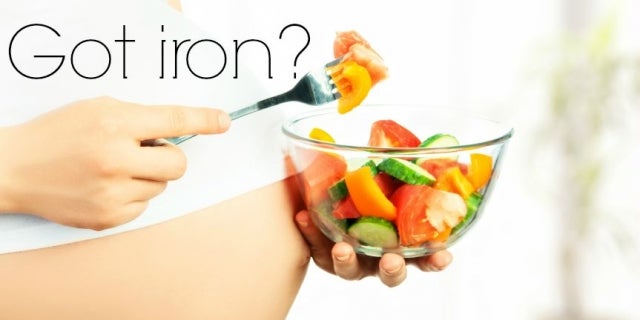Good nutrition is one of the top priorities during pregnancy. It is not only beneficial for mom, but also baby. In addition to a daily prenatal vitamin, we often think about getting a balanced diet of fruits and vegetables, whole grains, dairy, protein, and plenty of water. However, even our best intentions may overlook one critical nutrient for pregnancy – iron. A mineral responsible carrying oxygen in the blood throughout the body, iron is more efficiently absorbed into the body during pregnancy. To help make sure mom and baby are getting enough iron, it is important to consume more than your normal diet before pregnancy. Adequate iron consumption ensures mom and baby are getting enough oxygen, as well as helps mom ward off stress, disease, tiredness, weakness, irritability, and depression.
Here are good sources of iron to compliment proper pregnancy nutrition:
Meat and Seafood
Lean beef, chicken, crab, fish, lamb, pork, shrimp, turkey, and egg yolks
Fruits & Vegetables
Dried fruits, berries, grapes, grapefruit, oranges, plums, and watermelon
Broccoli, Brussels sprouts, black-eyed peas, spinach, and sweet potatoes
Legumes
Dry beans, peas, lentils, and soybeans
Breads and Cereals
Whole grains, enriched cereals, fortified breads, enriched pasta and rice
Other Sources
Peanut butter, peanuts, pine nuts, and pumpkin seeds
Women who are pregnant or nursing should aim to get 30 milligrams (mg) of iron a day. Through diet alone, you can get 30 mg of iron by eating three servings of iron-rich foods each day. Protein sources like meat allow for the greatest absorption of iron into the body. If you are vegetarian, vegan or pescatarian and do not eat meat, talk with your health care provider to make sure you are getting adequate iron in your diet. You may also ask your health care provider if you should take an iron supplement during your pregnancy. The National Academy of Sciences recommends an iron supplement in the second and third trimesters.
Boost Your Iron Absorption
What we consume can either help or hinder our iron consumption. Here are a few things to remember. Vitamin C helps with iron absorption. Good sources of vitamin C are orange juice, broccoli, strawberries and cabbage. Caffeinated products such as coffee, tea and chocolate can inhibit the absorption of iron. When eating iron-rich foods, do not consume caffeine one to three hours before or after. Also, did you know you can boost your iron intake by cooking foods in a cast iron skillet by up to 80 percent?
If you have questions about your prenatal nutrition, talk with your health care provider.

